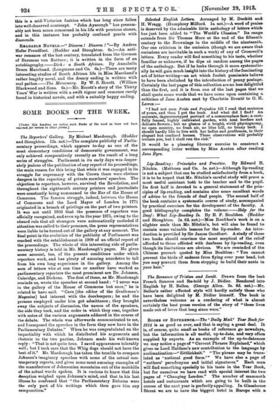SOI'LLE BOOKS OF THE WEEK.
U,,.er this heading we notice such Books of the teak as have not been reserved for racism in other forms.] The Reporters' Gallery. By Michael Macdonagh. (Hodder and Stoughton. 12s. net.)—The complete publicity of Parlia- mentary proceedings, which appears to-day as one of the most elementary conditions of democratic government, was only achieved comparatively recently as the result of a long series of struggles. Parliament in its early days was desper- ately jealous of the publication of any report of its proceedings, the main reason for this being that while it was engaged in its struggle for supremacy with the Crown there were obvious dangers in the reporting of private members' speeches. The objection to reporters, however, survived the Revolution, and throughout the eighteenth century printers and journalists were constantly being summoned to the Bar of the House of Commons. The famous struggle, indeed, between the House of Commons and the Lord Mayor of London in 1771 originated in a breach of privilege on the part of two printers. It was not until 1803 that the presence of reporters was officially recognized, and even up to the year 1875, owing to the absurd rule that all strangers were automatically excluded if attention was called to their presence, the press representatives were liable to be turned out of the gallery at any moment. The final point in the evolution of the publicity of Parliament was reached with the establishment in 1909 of an official report of the proceedings. The whole of this interesting side of parlia- mentary history is told in Mr. Macdonagh's pages. He gives some account, too, of the present conditions under which reporters work, and has plenty of amusing anecdotes to tell front his own long experience in the gallery. Among the men of letters who at one time or another have worked as parliamentary reporters the most prominent are Dr. Johnson, Coleridge, and Dickens. The first of these, as Mr. Macdonagh reminds us, wrote the speeches at second hand : "I never was in the gallery of the House of Commons but once," he is related to have said. " Cave [the editor of the Gentleman's Magazine] had interest with the doorkeepers ; he and the persons employed under him got admittance ; they brought away the subjects of discussion, the names of the speakers, the side they took, and the order in which they rose, together with notes of the various arguments adduced in the course of the debate. The whole was afterwards communicated to me, and I composed the speeches in the form they now have in the Parliamentary Debates." When he was congratulated on the impartiality with which he distributed his arguments and rhetoric to the two parties, Johnson made his well-known reply "That is not quite true. I saved appearances tolerably well ; but I took care that the Whig dogs should not have the best of it." Mr. Macdonagh has taken the trouble to compare Johnson's imaginary speeches with some of the actual con- temporary reports, and gives some most amusing examples of the manufacture of Johnsonian mountains out of the molehills of the actual words spoken. It is curious to know that this deception weighed upon Johnson's mind, and that in his last illness he confessed that " the Parliamentary Debates were the only part of his writings which then gave him any compunction."


















































 Previous page
Previous page